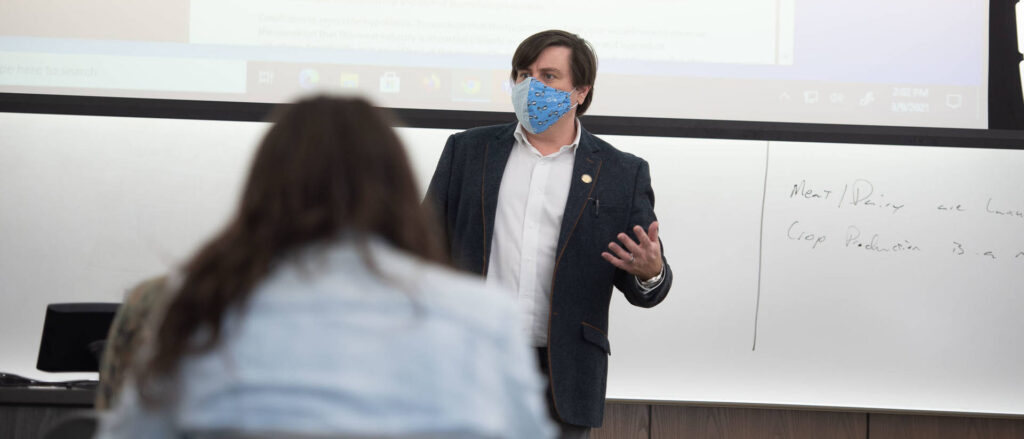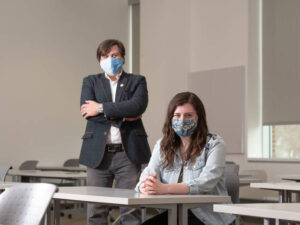
Dr. Thomas Kemp is teaching an economics class this semester that focuses on the economic impact of the COVID-19 pandemic. The class gives students an opportunity to research and analyze topics and data relating to the pandemic even as the crisis continues.
As the COVID-19 pandemic began sweeping across the world last spring, closing schools, shuttering businesses and overwhelming hospitals, Sara Patoka struggled to see how she might use her knowledge and skills to help those whose lives were being devastated by the public health crisis.
A newly created economics class at the University of Wisconsin-Eau Claire is helping the Blugold see the critical role she and other economists can play as people and communities work to recover.

Dr. Thomas Kemp (left) talks with Sara Patoka during an economics class focusing on the pandemic. Patoka says the class is helping her better understand how economists can help communities during a worldwide crisis.
“Being someone not in the medical field, when the pandemic first hit, I felt more than helpless and quite honestly, a bit nonessential,” says Patoka, a senior from Milwaukee. “This class demonstrates the essentialness of pulling meaning out of data and telling the story. Economists can be storytellers.
“We are not just looking at data, we are looking at how people’s lives have been changed. Our insights could be steppingstones for change and action to improve conditions inflicted by the pandemic.”
That is an incredible opportunity for someone who still is an undergraduate college student, says Patoka, who will graduate in May with degrees in economics and international business, a minor in Spanish and a certificate in equity, diversity and inclusiveness.
“At 22 years old, I feel I am able to make an impact through this timely coursework,” Patoka says. “Being a COVID grad is a unique experience, and this adds to it.”
The economics class, “The Empirical Economics of the COVID-19 Pandemic,” requires students to design research projects that focus on economics-related questions tied to the pandemic, and to use current real-world datasets to help them in their analysis, says Dr. Thomas Kemp, the professor of economics and chair of the economics department who designed and teaches the course.
Whenever possible, Kemp has students work on real economic issues using real economic data and methods. So, creating a class based on the pandemic was something he knew he wanted to do, he says.
Through the class, he is giving students opportunities to develop their research and analysis skills, and to better understand the impact their work can have on their communities and the world, Kemp says.
“I try to teach my students that a good economist must be useful and that economics — well done — can make communities better places,” Kemp says. “It’s too early to say for sure what we will find, but certainly the students have chosen some interesting research questions. At the very least, I think their work will help us to think more effectively about how to combat the next calamity of this sort.”
Kemp says the field of economics has become far more empirical in recent decades and textbooks really have not kept up with these trends. So, doing empirical research is something faculty often struggle to integrate into the classroom, he says.
“At the same time, we have huge amounts of data and research being done to mitigate the difficulties resulting from COVID,” Kemp says. “Developing this class seemed to be a good way to address these problems in a way that would be timely, impactful and interesting.”
She was eager to enroll in the class because there is so much to learn from the past year, especially when it comes to the economy, says Madeleine Mayer, a Wausau native who will graduate in May with degrees in accounting and business economics.
The class is helping her understand recent economic events as well as how the country could better react in the future if something like this were to happen again, Mayer says. It’s especially interesting to be studying the economic impact of the crisis when it is ongoing, she says.
“There is not a textbook explaining the situation of the economic crisis,” Mayer says. “We are looking at real-time data that is still being collected. Every day there is something new to talk about regarding COVID-19 and how it is being handled, which always makes class very interesting.”
Senior Ben Kaminski agrees, saying the timeliness of the class offers students learning opportunities that they cannot get in a more traditional economics class that focuses on past events.
“The challenges are more in line with the obstacles I will encounter in my future career,” says Kaminski, a Mequon native who will graduate in May with a degree in economics, minors in finance and actual science and a certificate in information systems. “In a typical class where you research a previous economic crisis, you have many scholarly articles on the topic, complete databases and hindsight to help guide you. Without a lot of that information, you’re forced to change your mindset and approach.”
The 24 students in the class are working in teams on six separate research projects. Some of the projects are more locally focused than others, but all of them should produce findings that will be applicable to the local economy, Kemp says.
Patoka’s research team is focusing on the pandemic’s inequitable impact on the unemployment levels of different wage classes. They are trying to identify the reasons that members of the low-wage category have experienced even larger levels of unemployment compared to middle- and high-wage earners by looking at the industries in which they work, she says.
“Essentially, we are looking at why people from lower income categories have experienced higher levels of unemployment throughout the pandemic,” Patoka says. “Part of our process will be looking at income data and unemployment filings. This interested our team because of the significance of finding out if there truly is a bias in terms of unemployment between different wage classes.
“Additionally, since we will look at several different industries, we can identify which industries have bigger biases than others. This could allow us or other future researchers to find out the causes of this bias and propose solutions to deal with it.”
Kaminski and Mayer are on a research team studying the wealth gap, specifically how COVID-19 effected skilled workers versus non-skilled workers. Their hypothesis is that COVID-19 has sped up wealth-distribution inequality in America, making it even larger than it was before the economic crisis.
“We found this topic very interesting because it appears as if skilled workers were able to seamlessly adjust to a new normal,” Mayer says. “They were able to work from home using technology and find other ways to still do their jobs. On the other hand, workers in jobs such as retail and hospitality were not able to do those things and because of that likely struggled over the last year.”
Research on their topic could be used to mitigate the effects of wealth-gap inequality in American should another event like COVID-19 occur in the future, Mayer says.
Their research also can help people better understand potential economic policies that could be implemented as the country tries to recover from the current crisis, Kaminski says.
Given the course’s topic, its timeliness and its potential impact on people’s lives now or in the future, Patoka says this class feels a bit different to her than others she’s taken as a Blugold.
“I am not working on a prefabricated problem with a correct answer,” Patoka says. “I feel the weight in the fact that we are doing meaningful work. I am not using made-up numbers. I am looking at which industries are suffering and how many people lost their jobs. I am looking at where inequalities lie and where aid should be properly directed.
“Not only are we working during a crisis doing timely work, but the work we do now can provide indicators and insights for the next time the world experiences something like this.”
After her May graduation, Patoka will begin her career as a financial analyst at Ecolab, a company headquartered in the Twin Cities. The experience she is gaining in Kemp’s class will help her as she begins her new position, she says.
“This class is providing a great space for actually working with data, and lots of it,” Patoka says. “As an economist, this is an essential function. As Dr. Kemp likes to remind us, being an economist, no one is going to ask us to draw supply and demand graphs. We need to be able to dig through the data and find the meaning.”
Kaminski says the experience of researching a current economic problem will be helpful as he begins his graduate studies in finance after graduation.
For Mayer, the course is adding to her understanding of economics, which will be helpful as she begins her job as an accounting associate with CliftonLarsonAllen.
Patoka, who is in the University Honors Program, was drawn to UW-Eau Claire because of the sense of community she found on campus, as well as the diverse academic programs it offers. The pandemic-related economics class is another example of faculty going above and beyond to give students meaningful academic experiences, she says.
Kaminski also appreciates the work Kemp put into creating a class during such chaotic times.
“Given all the current restrictions, teachers have had to completely change how they do their job and Dr. Kemp has done a great job making the most of a bad situation,” Kaminski says of the class.
Professors like Kemp helped inspire her to study economics, says Patoka, who came to UW-Eau Claire undecided on a major. During her first semesters of college, she took a variety of classes, with topics ranging from world religions to sustainability to music appreciation and writing, she says.
“I came in an undeclared first-gen student who had no clue what path to choose,” Patoka says. “I will never forget the microeconomics class taught by Dr. Maria DaCosta, a professor of economics. The passion with which she spoke about the content drew me in and sparked my interest. I later took career surveys with economics listed as a top suggestion, and that was my journey. After solidifying economics as my major, international business and Spanish seemed to be complementary fits.”
As she nears graduation, she is more certain than ever that she’s on the right path, Patoka says.
“What I love about economics is the assorted career paths I can pursue with it — the sky is the limit,” Patoka says. “I value the background it has provided me as I feel it has aided me in becoming a more worldly person and more prepared to enter the workforce.”
Through her economics studies, she has taken other classes taught by Kemp and she was part of his faculty-student research team, all positive experiences, she says. So, knowing Kemp would be teaching the special COVID-19-related class made her that much more interested in enrolling, Patoka says.
“Dr. Kemp embodies all there is to be passionate about in economics,” Patoka says. “He strives to make every student feel confident in their work and know that success is attainable if they put in the work.”
